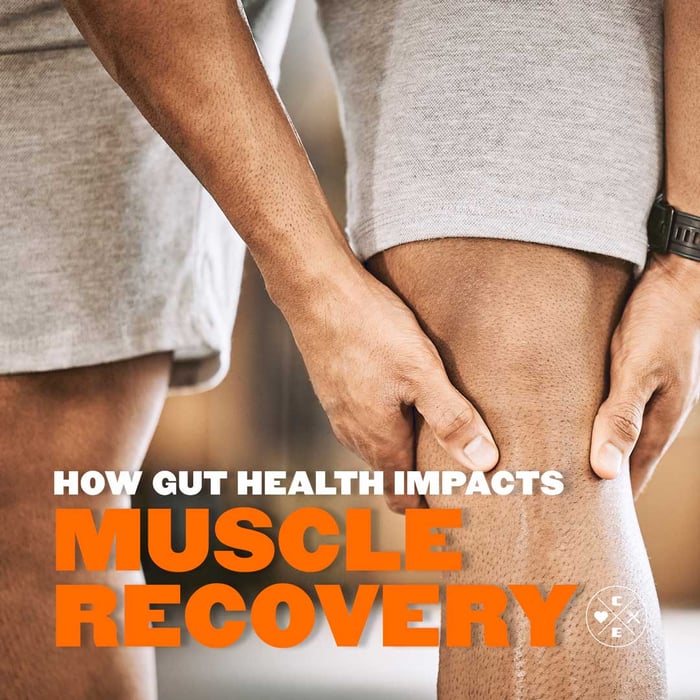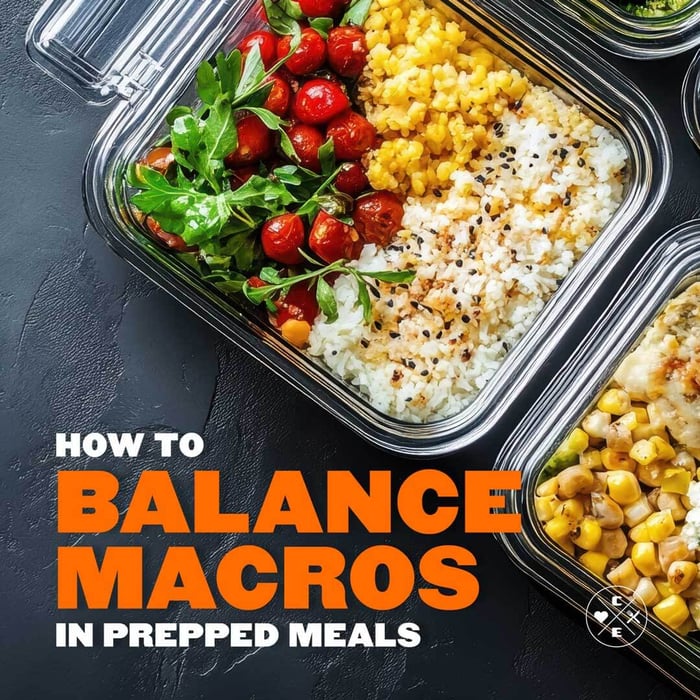How Gut Health Impacts Muscle Recovery

Jason Nista
Nutrition
|
Exercises & Fitness
|
Healthy Lifestyle
01/08/2025 7:23am
7 minute read
Did you know your gut health directly affects how well your muscles recover after exercise? Research shows that the gut microbiome - trillions of bacteria in your digestive system - plays a major role in reducing inflammation, improving nutrient absorption, and speeding up recovery.
Key Takeaways:
- Gut Bacteria and Recovery: Gut bacteria produce SCFAs (short-chain fatty acids), which improve glucose availability, blood flow, and insulin sensitivity - key factors for muscle repair.
- Foods That Help: High-fiber foods (like bananas and asparagus), fermented foods (like yogurt and kimchi), and a balanced diet with protein, complex carbs, and healthy fats support gut and muscle health.
- Probiotics: Supplements or foods with probiotics can reduce muscle inflammation by up to 43% and improve recovery time.
- Hydration and Rest: Proper hydration and sleep are essential for both gut health and muscle repair.
By focusing on your diet, adding probiotics, and maintaining good habits like hydration and rest, you can strengthen the gut-muscle connection and recover faster after workouts.
Do Probiotics Improve Muscle Recovery?
The Science of Gut-Muscle Interaction
Your gut microbiome plays a direct role in how your muscles recover and grow. This relationship is more intricate than most people realize.
What Is the Gut Microbiome?
The gut microbiome is made up of trillions of microorganisms, including bacteria and fungi, that live in your digestive system. These tiny organisms are essential for breaking down nutrients and controlling inflammation - both crucial for muscle repair.
Research has shown that mice without gut bacteria experience reduced muscle mass [1]. This highlights just how important these microorganisms are for maintaining muscle health.
How the Gut and Muscles Communicate
The connection between your gut and muscles happens through immune and hormonal pathways. A big player in this process is a group of compounds called SCFAs (short-chain fatty acids). Here's how they help with muscle recovery:
| SCFA Role | Effect on Muscle Recovery |
|---|---|
| Regulates Glucose | Provides muscles with energy |
| Improves Blood Flow | Delivers nutrients to muscles |
| Boosts Insulin Sensitivity | Enhances nutrient absorption |
Certain gut bacteria, like Veillonella, produce butyrate, a compound that boosts athletic performance and speeds up recovery [3]. This was demonstrated in a Boston Marathon study, where runners with butyrate-producing bacteria recovered faster.
"Identifying substances from gut bacteria that aid muscle growth could help combat muscle loss from aging or illness." - Taylor Valentino, Researcher [1]
When the balance of gut bacteria is disrupted - a condition called dysbiosis - it can slow down muscle recovery. For example, antibiotics can upset this balance, delaying recovery and emphasizing the need for a healthy microbiome [1].
This gut-muscle connection shows why eating foods that support your microbiome is so important.
Nutrition Strategies for Gut and Muscle Health
What you eat plays a huge role in keeping your gut healthy and supporting muscle recovery. By following specific dietary approaches, you can strengthen the connection between the gut and muscles to promote better healing and growth.
Balanced Diet with Macronutrients
A well-balanced diet is key to supporting both your gut and muscles. Here's how macronutrients contribute:
| Macronutrient | Recovery Role | Gut Health Impact |
|---|---|---|
| Protein | Repairs muscle tissue | Helps strengthen the intestinal barrier and supports the growth of good bacteria. |
| Complex Carbs | Restores energy | Feeds beneficial bacteria through resistant starch found in foods like oats and sweet potatoes. |
| Healthy Fats | Reduces inflammation | Improves nutrient absorption and reduces gut inflammation with omega-3s. |
To get the most out of your meals, include lean protein, whole grains, and healthy fats like avocados or olive oil.
High-Fiber and Prebiotic Foods
Fiber-rich foods are essential for gut health, and they indirectly support muscle repair. Beneficial gut bacteria break down fiber to produce short-chain fatty acids (SCFAs), which play a role in muscle function.
Some top prebiotic food choices are:
- Asparagus
- Bananas
- Onions
- Jerusalem artichokes
Adding these to your diet can fuel your gut bacteria and boost your overall health.
Fermented Foods and Probiotics
Fermented foods are a fantastic way to improve the diversity and function of your gut microbiome. A healthier gut means better nutrient absorption and less muscle inflammation. For example, a study found that probiotic supplements helped resistance-trained men recover faster by reducing muscle inflammation [2].
Try these fermented options:
- Yogurt with live cultures
- Kimchi
- Kefir
- Sauerkraut
These foods are loaded with probiotics, which help keep your microbiome balanced, speed up muscle recovery, and lower post-exercise inflammation by supporting gut health.
sbb-itb-1989a25
Practical Tips for Gut Health and Recovery
Taking care of your gut health and aiding muscle recovery involves more than just eating well. Here’s how you can effectively support both as part of your fitness routine.
Probiotics and Supplements
Certain probiotics can play a big role in muscle recovery. For example, a study found that specific probiotic strains reduced muscle inflammation by 43% compared to a placebo after only 21 days of use [2]. To get the most out of probiotics:
- Look for products with 10-30 billion CFUs.
- Opt for supplements that include multiple strains to cover a range of benefits.
- Check for third-party testing certifications to ensure quality.
- Store them correctly, especially if refrigeration is needed.
Clean Eatz Kitchen: Nutrition Made Easy
![]()
Probiotics are great, but they’re just one piece of the puzzle. Consistent, balanced meals are just as important for recovery. Clean Eatz Kitchen offers chef-prepared, portion-controlled meals that are designed to support both gut and muscle health. They also provide gluten-free options and customizable plans to fit various diets, making it easier to stick to your nutritional goals.
Hydration and Rest
What you eat is crucial, but don’t overlook hydration and rest - they’re just as important for keeping your gut and muscles in top shape. Staying hydrated helps with digestion and nutrient absorption, both of which are key for a healthy gut.
"The gut microbiota influences overall health and athletic performance", says Daniel Badia, a nutritionist and biologist [3].
Here are some simple steps to boost recovery:
- Drink water and electrolyte-rich beverages after workouts.
- Aim for 7–9 hours of sleep each night.
- Incorporate regular rest days into your training routine.
Research on marathon runners shows that proper hydration and rest not only improve athletic performance but also support gut health [3]. These foundational habits, combined with good nutrition, create a strong base for recovery.
Conclusion: Gut Health for Faster Muscle Recovery
Gut health plays a key role in how effectively your muscles recover. A balanced gut microbiome helps reduce inflammation and improves nutrient absorption - both crucial for athletic performance. On the flip side, poor gut health can slow down muscle growth and repair, making it an important focus for anyone looking to boost recovery.
Here are three practical ways to support recovery through gut health:
- Focus on Your Diet: Eating fiber-rich foods and incorporating fermented options like yogurt or kimchi can help maintain beneficial gut bacteria, laying the groundwork for better recovery.
- Consider Probiotics: Research suggests that probiotics may help reduce muscle inflammation, making them a solid addition to your recovery plan [2].
- Adopt Healthy Habits: Staying hydrated and getting enough rest not only aids recovery but also supports a healthier gut, creating a cycle that benefits overall performance.
"The gut microbiota influences overall health and athletic performance", says nutritionist and biologist Daniel Badia [3].
Improving gut health takes time and consistency, but the results can enhance both your recovery and athletic goals. By starting now, you're setting yourself up for better performance and more effective recovery in the long run.
FAQs
Do probiotics help with muscle recovery?
Yes, they can. Specific strains like Bifidobacterium longum and Bacillus coagulans have been shown to support muscle recovery by aiding nutrient absorption, reducing inflammation, and speeding up recovery time.
Research backs this up: studies show a 43% reduction in inflammation markers after using probiotics, with benefits lasting up to 48 hours post-exercise [2]. Less inflammation means quicker recovery and better performance.
Here’s how probiotics may aid recovery:
- Better nutrient absorption
- Reduced muscle damage
- Improved energy use
- Shorter recovery periods
To include probiotics in your routine, consider:
- Quality supplements
- Probiotic-rich foods
- Balanced meals
For the best results, pair probiotics with good nutrition, hydration, and enough rest. Together, these elements help your body recover faster by boosting the gut-muscle connection and managing inflammation effectively.
Related Articles
How to Balance Macros in Prepped Meals
8 minute read



